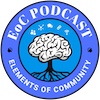Building Community Inside Corporates & Private Marketplaces
Welcome to Elements of Community!
I am your host, Lucas Root, and in this episode, we are going to talk about building community inside corporates, and private marketplaces. Joining me in this episode is Thomas Power.
Thomas Power believes in Community Led Growth (CLG) supporting people to grow themselves, their health, their mind, their business, and increase their organization. All three of their children support them in their endeavor of Community Building.
Thomas and his wife Penny have been building communities online for more than 30 years.
Here’s just a taste of our talking points this week:
Why Does Thomas Love Community Building?
Thomas mentioned that community building is his favorite thing to do, it is what he is passionate about, and ultimately what he will do on his final day.
The reason behind his love for community building is because he enjoys making connections that other people can’t see.
Supporting People Through Love & Money
Thomas said, “You can effectively build intimacy as a service that results in better outcomes, which includes making more money for deals, because I know people have got to make money.”
What Thomas and Penny are trying to do is to support people through love and money, so they will get all the love and support for the issues they face.
Other subjects we covered on the show:
- Who are the people unsuitable for community building?
- What is the main challenge with organizations these days?
- Why do businesses need to be personal?
- The reason why common language should be reincorporated into us living our daily lives.
- Which one of the elements of community would Thomas pick to drive his community forward?
- Lastly, the curveball question—why does it take so long to get from CSC to ORS?
If you want to know more about Thomas Power, you may reach out to him at:
- Facebook Profile: https://www.facebook.com/thomaspower1964
- Instagram Handle: thomaspower
- LinkedIn Profile: https://www.linkedin.com/in/thomaspower/
